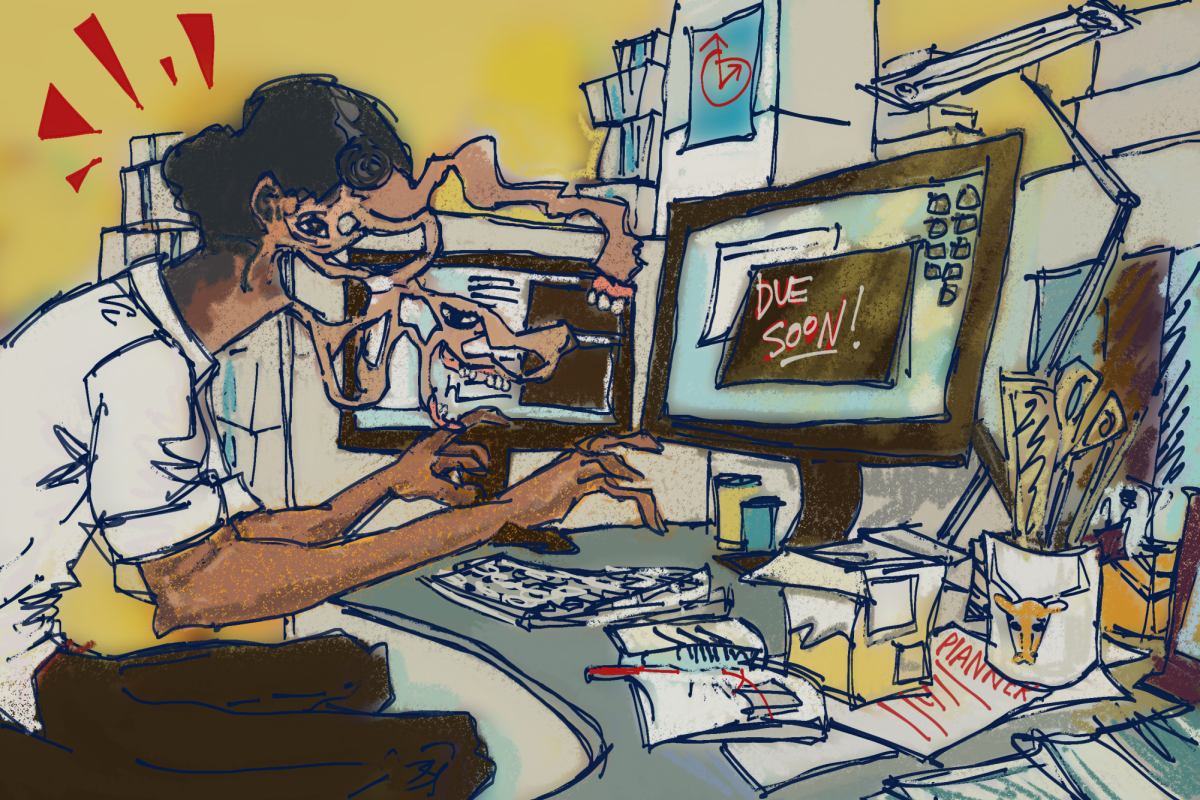From late-night jobs to internships and leadership positions in student organizations, many full-time students juggle multiple hustles at once. For some students, working is a necessity, so prioritizing their mental health becomes increasingly important.
According to Mental Health America, about half of all full-time college students work jobs outside school, and this number jumps to 80% with part-time students. One study showed that 70% of college students are stressed about finances.
The inability to cope effectively with the challenges of professional and academic life can have severe repercussions on a student’s mental health and well-being, such as burnout, anxiety, depression and panic disorder, the National Library of Medicine said.
Ginny Maril, director of Clinical Services at the Counseling and Mental Health Center, said that stress looks different for everyone, but the best thing you can do for yourself is to slow down.
This can be anything from spending time outside, hanging out with friends or meditating.
“Slowing down might be doing breathing exercises because that physiologically helps you slow down,” Maril said. “It helps your brain slow down as well and (to be) more present where you are in the moment.”
Economics junior Ammu said along with a 20-hour course load, they spend 10 to 20 hours a week on their start-up non-profit organization, Indigo Collective, and 10 to 14 hours a week driving for Sure Walk.
“I’ve gotten so used to pulling all-nighters that I can consistently operate on an all-nighter and then give myself sleep when I have gaps in my schedule,” Ammu said.
For Ammu, a regular Monday looks like back-to-back classes and studying or working for Indigo Collective until the late hours of the night. Then, Ammu spends their weekend nights driving for Sure Walk.
“I’m neurodivergent, taking medication for ADHD and then at one point I was diagnosed with really chronic depression,” Ammu said. “I do my best to manage it, and I’m not the best at it. … Sometimes I’ll feel like I’m stuck in bed, I’m paralyzed and I can’t move. Giving myself a routine and a challenge has given me a way to manage some of the symptoms.”
Another self-care outlet for Ammu is music. Ammu created a playlist for every type of mood they might feel, including their “healing” playlist they listen to when they’re feeling down, which consists of slow R&B and jazz tracks.
Petroleum engineering junior Jared Henderson operates on a similar schedule, taking 15 credit hours and working part-time at both The Pizza Press and Sweetgreen.
“Balancing (applying to internships), along with work and classes can make it hard to work enough hours just (to make ends meet),” Henderson said.
Both Ammu and Henderson said they rely on income from their jobs and financial aid to support themselves.
“I’ve definitely (missed out on) hanging out with friends a lot to make sure I could go work,” Henderson said.
Working while in school can hinder one’s social life due to a lack of time and physical energy, but Maril said positive social support is the best thing one can do for their physical and mental health.
“Closing at Pizza Press can also be hard because when I first started working there I was doing a lot of closes, even during weekdays,” Henderson said. “Which would make it so I couldn’t function the next day during classes.”
Henderson also manages his mental health by making sure to go to sleep early on nights he isn’t working.
Whatever your extenuating schedule might look like, it’s important to find a self-care routine that works for you. Whether it’s music, a good night’s rest or making time for your friends, remember your health comes before your hustles.
Harrison is a journalism senior from Dallas, Texas.














